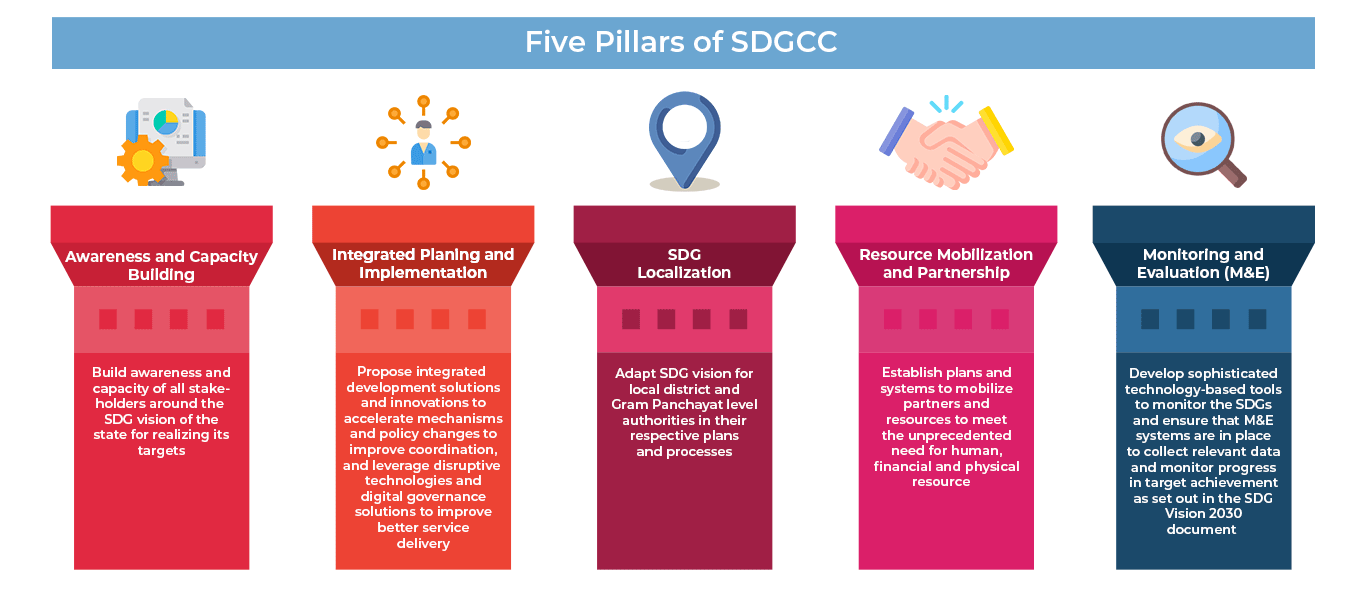Sustainable Development Goals Coordination Centres
UNDP SDGCCs are institutional setups that assist State Governments in integrated policy making, creating inter-linkages and synergies, developing strong monitoring systems, and ensuring coordination among all stakeholders.
SDGCCs are embedded in the Departments of Planning, Economics and Statistics, and Finance Departments of different states devoted solely to ensuring effective governance and convergence among departments and stakeholders for achieving the SDGs.
NITI Aayog and State/UT Governments with technical support from UNDP have advanced SDG localization through the establishment of SDG Coordination Centres (SDGCCs) in several States/UTs. These centres have created a clear, measurable, and well-defined pathway for progress- an essential element that had been notably underrepresented.
However, successive editions of the SDG India Index reveal uneven progress across States/UTs and Goals, particularly in gender and nutrition. To this end, an enhanced strategy for the SDGCC is proposed. NITI Aayog aims to support the establishment of SDGCAC (Sustainable Development Goals Coordination and Acceleration Centres) based on the successes and experiences of States/UTs with established SDGCCs. These redefined centres will play a crucial role in supporting and facilitating the implementation of SDGs at the ground level, thereby making significant contributions to effective localization efforts.

The Centre for Public Policy and Good Governance (CPPGG) in collaboration with the United Nations Development Program (UNDP) have identified inspiring changemakers of Uttarakhand and recognized them as SDG Achievers. The vision behind the SDG Achievers Awards was not just to appreciate their efforts but also to promote a sense of cooperation and develop relations to encourage the formation of a collaborative support system with these goalkeepers to work towards sustainable development of the State. Innovative initiatives of these awardees are documented in the book “Agragami 1.0” and “Agragami 2.0“.

The SDGCC was set up by UNDP in partnership with the Department of Planning, Program Monitoring and Statistics, Government of Karnataka to fulfil the 2030 agenda for Sustainable Development Goals in Karnataka. The SDGCC was part of coordinating, organising, and documenting the launch of Karnataka’s SDG Vision 2030- Strategies and Action Plan for Karnataka. The SDGCC facilitated the creation of an SDG dashboard on Avalokana, a web portal of the Government of Karnataka. It also created an SDG aligned CSR Matchmaking Portal called Akanksha to involve and facilitate collaborations with Public-Private Partnerships, CSR organisations, Foundations, NGOs, Multilaterals, and line departments of the government. The Akanksha platform will enable private sector engagement initiatives in Karnataka to align their CSR goals with the State’s SDG priorities and showcase the best CSR practices. Other activities include engaging youth for SDGs and developing e-market systems for SHGs for livelihood support during COVID-19 to name a few.
The SDGCC is the capacity building centre, a catalyst and resources centre, a think tank, a knowledge centre and a monitoring post for all supporting departments and ministries of the Government of Punjab. It is responsible for initiating action for convening on SDG-related issues, as also meetings at the government level, as and when required. The SDGCC has undertaken numerous communications, capacity-building and awareness-generation activities on SDGs for government officials and citizens. Efforts in SDG localisation involve the creation of a District SDG Cell in Patiala District and aligning Gaon Panchayat Development Plans (GPDP) with the SDGs. The Center is also working closely with relevant government departments, technical agencies, civil society organizations, industry partners, and academic institutions to create an SDG Pilot Model Cluster, an incubation unit to pilot various SDG projects. Other initiatives include mixed methods study on stigma and discrimination associated with COVID-19 and Atmanirbhar Bharat Tracker to name a few.
Following the successful completion of the project, SDGCC Punjab has been handed over to the Government of Punjab.
The SDGCC was formed on the 6th of August 2018 as a result of the partnership between UNDP and the Government of Haryana to conceptualize and implement initiatives that help establish SDGs in Haryana. Within a short span of time, the SDGCC has worked extensively in integrated planning, resource mobilisation and partnerships, SDG localisation, awareness generation and capacity building and Monitoring and evaluation. Haryana is one of the first few states to adopt the Output-Outcome Framework; this serves as the foundational step for aligning the state government’s public spending, and development and welfare efforts with the SDGs. Other notable initiatives include mapping NGOs, CSRs, and academic institutions in Haryana with the SDGs, the launch of SDG First- a virtual exchange platform to deliberate on development issues, and Atmanirbhar Bharat Tracker.
Click here to know more about the journey of SDGCC Haryana – SDG Journey
The Centre for Public Policy and Good Governance (CPPGG),founded in 2017, and set up in the Department of Planning is an autonomous think-tank to support the Government of Uttarakhand to strategize governance and policy reforms in alignment with SDGs. One of the major mandates of the Centre is to assist the state government departments in policy-level support by providing an analytical base. UNDP has supported the CPPGG to accelerate the implementation of Sustainable Development Goals (SDGs) in Uttarakhand. Uttarakhand is the first State of federal India to launch its SDG dashboard in sync with the India SDG dashboard.
The SDGCC Nagaland was established in October 2019 by UNDP in partnership with the Planning and Transformation Department, Government of Nagaland to ensure effective coordination between departments and act as a support to the State Government for the
implementation of SDGs in the State. The SDGCC has formulated the Nagaland SDG Vision 2030 and various knowledge documents for localizing and integrating the SDGs in the state. The SDGCC has also carried out various citizen centric SDG aligned activities like the Green Christmas campaign, SDG One Stop Destination at the State Annual Hornbill Festival, and the ‘SDG Innovation Participatory Action Research Initiative’ to promote the implementation of innovative projects which will contribute towards the achievement of SDGs at the grassroots level. Nagaland SDG Dashboard is also being developed as a single platform for real-time data collection, monitoring, and evaluation.
SDGCC Tamil Nadu was set up by UNDP India at the Planning and Development Department, Government of Tamil Nadu (GoTN) in 2022 for upgrading the state’s developmental actions into global standards through effective enactment and localisation of the Sustainable Development Goals. As a resource centre, the SDGCC acts as a think tank for the Government for integrating the actions and measures the progress towards bringing everyone together to ensure that no one is left behind. The SDGCC presently focuses on the following verticals –
(i) Health & Nutrition
(ii) Inclusive skilling, employment & livelihood
(iii) Mobility & Energy Transition
(iv) Women in gender mainstreaming.
The SDGCC also supports the efforts of GoTN in localisation of SDGs with the development of Panchayath and Urban Indicator Framework along with sensitisation programs for line departments. The Centre has also mapped potential partners such as, individual experts, voluntary and private organisations in relevance to fostering the localisation and to ensure the last mile delivery to the beneficiaries.
Newsletter
UNDP Newsletter_Vol 1_ Issue 1
UNDP Newsletter_Vol 1_Issue 2
UNDP Newsletter_Vol 1_Issue 3
UNDP Newsletter_Vol 2_Issue 1
UNDP Newsletter_Vol 2_Issue 2
UNDP-Newsletter-Vol-2-Issue-3
UNDP-Newsletter-Vol-2-Issue-4
UNDP-Newsletter-Vol-3-Issue-1
UNDP-Newsletter-Vol-3-Issue-2
Policy Documents
Policy Round Table “Enhancing Apprenticeship Engagement in Tamil Nadu”
Policy Round Table “Improving School Learning Outcomes”
Policy Round Table “Energy Transition and Industrial Development”
Best Practices
Tamil Nadu’s path towards Youth Guarantee Framework- Setting up of Thiranagams
The Government of Uttar Pradesh (GoUP) and UNDP India entered a technical partnership to establish an SDG Monitoring Cell (SDGMC) at the Planning Department, GoUP. Furthering the localisation efforts of GoUP, the SDGMC will be working towards enhancing the monitoring of State and District Indicator Frameworks through augmented capacities and institutional mechanisms, strengthening capacities at the level of districts and local governments, and improving communication and outreach on the SDGs. This project is of particular significance as it seeks to accelerate progress on the SDGs through effective monitoring and actioning across 75 districts of Uttar Pradesh, home to 233 million people.
SDGCC Jammu was set up with the aim to support the Government of Jammu & Kashmir achieve the SDG targets in the UT. Established with the support of NITI Aayog, the SDGCC has made significant progress by conducting capacity building workshops for government departments and district officials and drafting the UT Indicator Framework and District Indicator Framework after multiple rounds of consultations. The Centre is currently working on preparing the SDG Progress Report, which will provide an extensive overview of the progress achieved by 28 departments and 20 districts. SDGCC Jammu also aims to integrate technology into data collection and monitoring in the form of the SDG Dashboard.
The United Nations Development Programme (UNDP) has partnered with the State government of Mizoram to localize the Sustainable Development Goals (SDGs). Since May 2023, significant progress has been made in this direction, including conducting state-level consultations, revising indicator frameworks, and developing the Consolidated Indicator Framework (CIF) and Village Indicator Framework (VIF).
A series of meetings with relevant departments, integration of data from Central Ministry sources, and the initiation of the process to engage an IT agency for the creation of the SDG dashboard and CSR matchmaking portal have been carried out. The forthcoming steps involve finalizing the indicators and launching the SDG Dashboard and CSR Matchmaking portal.
These initiatives demonstrate Mizoram’s focused strategy towards the achievement of sustainable development goals.
The Rourkela Cold Room Project is a first-of-its-kind initiative in India that brings together sustainability, livelihood enhancement, and gender empowerment under one integrated solution. Designed and implemented by the Rourkela Municipal Corporation with support from UNDP through the Global Mayors Challenge, the project has established five solar-powered cold storage units operated by women from Self-Help Groups (SHGs). By reducing post-harvest losses and ensuring longer shelf life for perishable produce, the project directly supports farmers and street vendors, who often lack access to reliable storage infrastructure.
With its grassroots implementation model and strong focus on equality, the project embodies the spirit of SDG 2 (Zero Hunger), SDG 5 (Gender Equality), and SDG 7 (Affordable and Clean Energy). The initiative has trained over 25 women and has engaged over 270 farmers and vendors through awareness campaigns and training sessions, ensuring that the benefits of cold storage are widely accessible. The project’s success has gained international recognition, including a finalist spot in the Diversity and Inclusion category at the Smart City Expo World Congress 2024, positioning Rourkela as a replicable model for climate-smart urban development.

